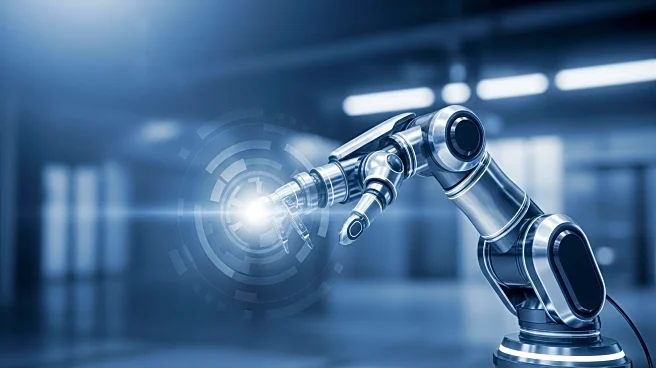What's Happening?
SoftBank Group has announced its acquisition of ABB Robotics for $5.4 billion, marking a significant move in the industrial automation sector. This acquisition reshapes ABB's corporate structure and signals SoftBank's intent to expand its presence in industrial robotics, a market known for its scale and profitability. SoftBank, previously known for its experimental ventures in robotics, such as the humanoid robot Pepper and Boston Dynamics' Spot and Atlas robots, is now focusing on integrating artificial intelligence with physical systems. The acquisition aligns with SoftBank's vision of 'Physical AI,' combining AI with robotics to drive innovation in sectors like automotive, electronics, and logistics.
Why It's Important?
The acquisition of ABB Robotics by SoftBank is crucial for the robotics industry as it could lead to accelerated innovation through the integration of AI expertise and capital. For SoftBank, this move represents a strategic shift towards industrial robotics, potentially positioning the company as a leader in AI-powered robotics. The deal also reflects ABB's decision to divest from robotics, indicating limited synergies with its other divisions. If successful, SoftBank's commitment to 'Physical AI' could propel advancements in robotics, benefiting industries reliant on automation and AI-driven solutions.
What's Next?
The ABB-SoftBank deal is expected to close in 2026, pending regulatory approvals. The industry will be closely watching to see if SoftBank integrates ABB's technology with its AI portfolio effectively, potentially transforming ABB Robotics into a central player in AI-powered robotics. The outcome will determine whether SoftBank's acquisition is a long-term strategic investment or another short-term venture. The deal's success could lead to new partnerships and innovations in the robotics sector, while failure might result in a repeat of past cycles of bold entries and quick exits by SoftBank.
Beyond the Headlines
SoftBank's acquisition of ABB Robotics highlights the growing importance of AI in industrial applications. The move could trigger ethical and cultural discussions about the role of AI in automation and its impact on employment. Additionally, the integration of AI with robotics raises questions about data privacy and security, as these systems become more autonomous and capable of decision-making. Long-term, this development could influence global standards for AI and robotics, shaping the future of industrial automation.










